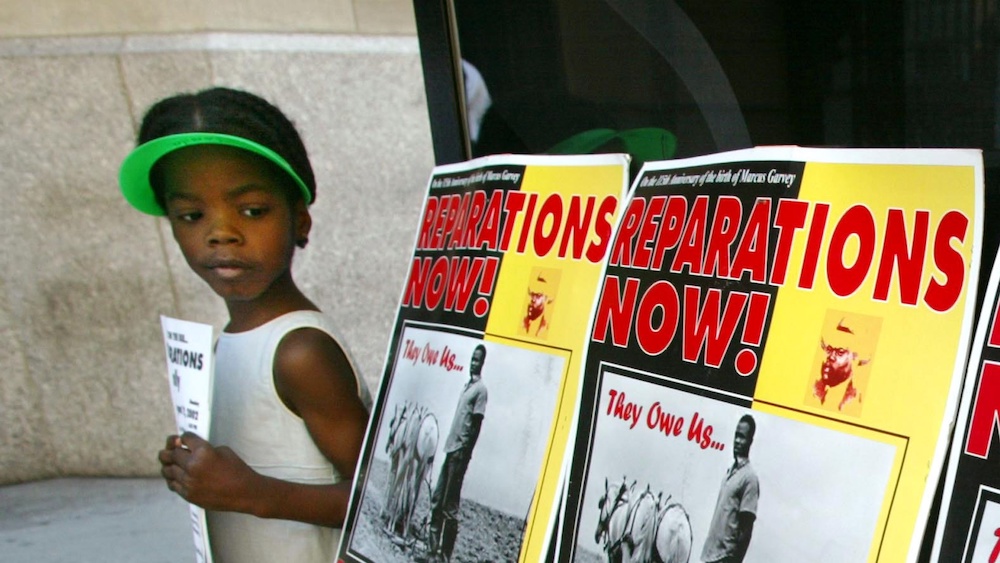If you’re interested in sharing your opinion on any cultural, political or personal topic, create an account here and check out our how-to post to learn more.
Opinions are the writer’s own and not those of Blavity's.
____
Reparations. I don’t believe there is a word that generates more emotion than this in America.
For some, it’s the absolute minimum required to start the healing process in America. For others, well, we know what it is.
I often hear the arguments against reparations. The funny thing is, these were not issues when America decided to pay reparations to slave owners in 1862. There weren’t many who were against America supporting reparations for Jewish victims of the Holocaust, like after World War II in their demands for reparations from Germany and Austria.
But when it comes to paying reparations to descendants of slaves, we’ve seen little hope of action taking place. I’m often asked what other options we should push for if actual reparations are generations away from happening.
Whatever the possible solution could be, it needs to be extremely significant if Congress fails to pass a reparations bill. We’re talking about hundreds of years where Black people have been systematically denied opportunities for career advancement, access to capital, and homeownership. In other words, we have been denied access to the American dream.
The very wealth America was built upon was on the backs of enslaved people. Black people were the capital that literally built this country. White people continue to benefit from slavery and privilege, whether or not their ancestors owned slaves. This debt has yet to be repaid.
The vast racial wealth gap is there for a reason. It began with slavery and Jim Crow and continues to this day through redlining, workplace discrimination, mass incarceration, police brutality and voter suppression. Black people have been forced to bear the legacy of slavery, and we feel it every day, in every way.
So what can we do that can put a dent in this? It needs to be simple to conceptualize, symbolic to help heal and impactful to help reduce the massive wealth gap.
The idea that I’ve heard that I support most is eliminating federal income tax for descendants of slaves for the next 400 years.
Economically, by eliminating the federal income tax for American descendants of Black slaves, we would see an immediate impact on Black wealth as more money stays in our pockets. By being able to save more, Black families will be able to finally close the wealth gap since we’d finally have an advantage large enough to make real progress.
Spiritually and emotionally, we would finally see an act that recognizes the last 400 years of mistreatment. America’s systemic racism has impacted many generations. It is only fair that the healing process lasts for an equal number of generations.
It’s clear reparations, or whichever solutions we come up with, will have to impact descendants of American slaves specifically. One of the biggest roadblocks will be deciding to which degree someone can be considered a descendant. The ancestral tracing is a sensitive topic as those against healing this nation have weaponized this question for years. Should someone who has not had a Black relative for the past four generations but is able to trace an ancestor who was a slave be allowed to receive reparations?
We need to be prepared for this question and have specific numbers to understand just how many of us have ancestors who were slaves. Count everyone first, then go backward from there.
But we’re sure to encounter many counterarguments. The most common question people are sure to ask is who will pay for this. How will America make up for the lost tax revenue? The answer is quite simple, really. When companies like Amazon net 386 billion U.S. dollars in 2020 sales and pay little to no federal taxes, we have a problem. Or an opportunity.
In a single bill, the U.S. government can finally charge taxes to the wealthiest Americans while eliminating federal income taxes for descendants of Black slaves.
So what can corporations do while the public sector works all of this out?
Corporate leaders must decide to invest in real change. Either Black Lives Matter, or they don’t. Consumers, corporate sponsors and employees must hold those companies who refuse to lead out loud accountable, starting with CEOs. Gone are the days where it is OK to sit on the sidelines and do nothing. If leaders refuse to take action, Black consumers should take their $1.2 trillion buying power elsewhere.
Corporations also need to shift from making promises and pledges to making transparent strategic investments in Black businesses to make a more equitable society for all.
There are no excuses for the racial disparities that exist today. Now is the time to force real change.
____
Sharon Smith-Akinsanya is an author and the CEO/Founder of PeopleOfColorCareers.com.
